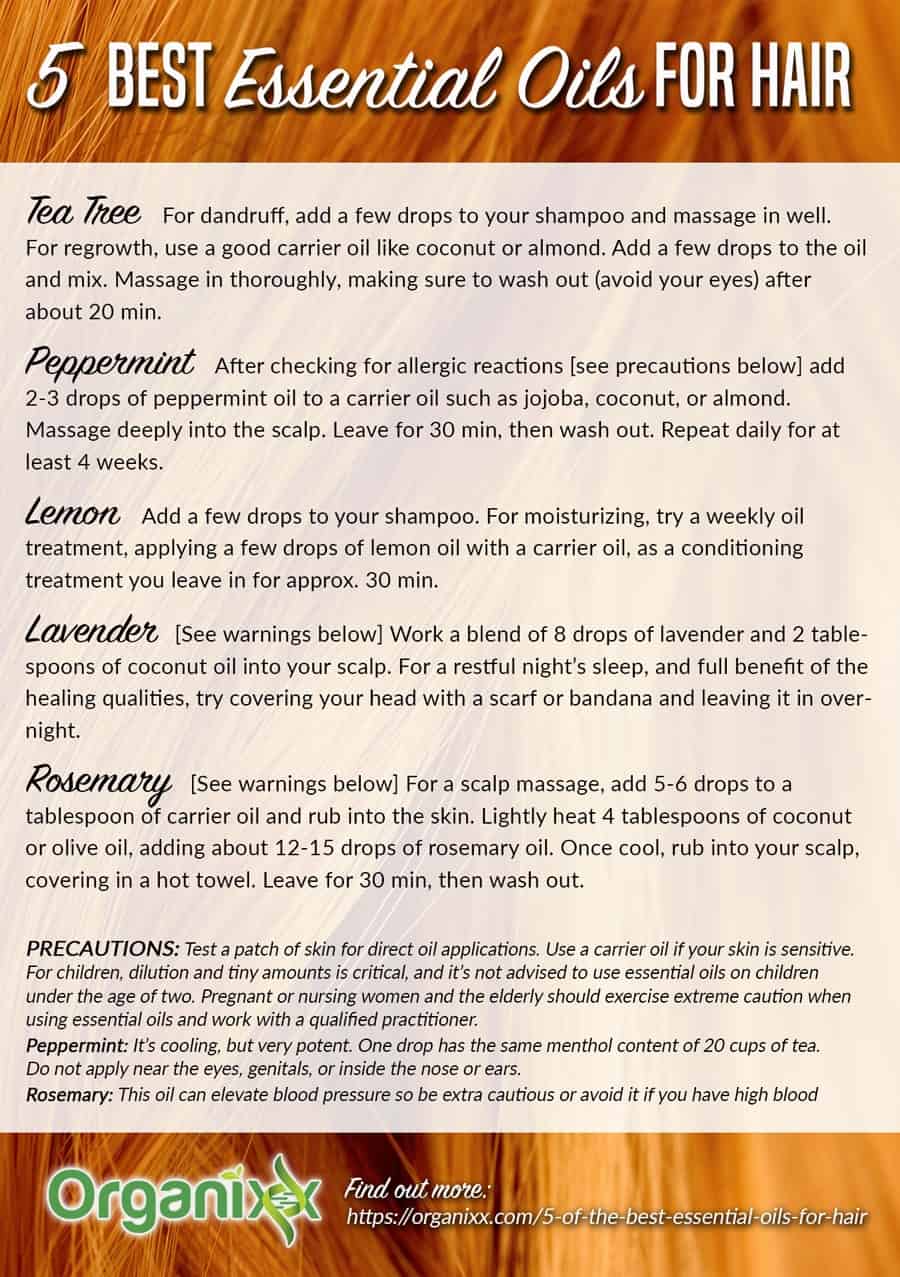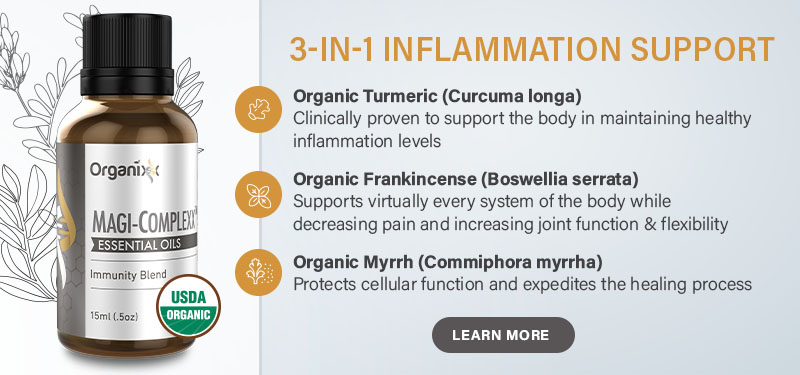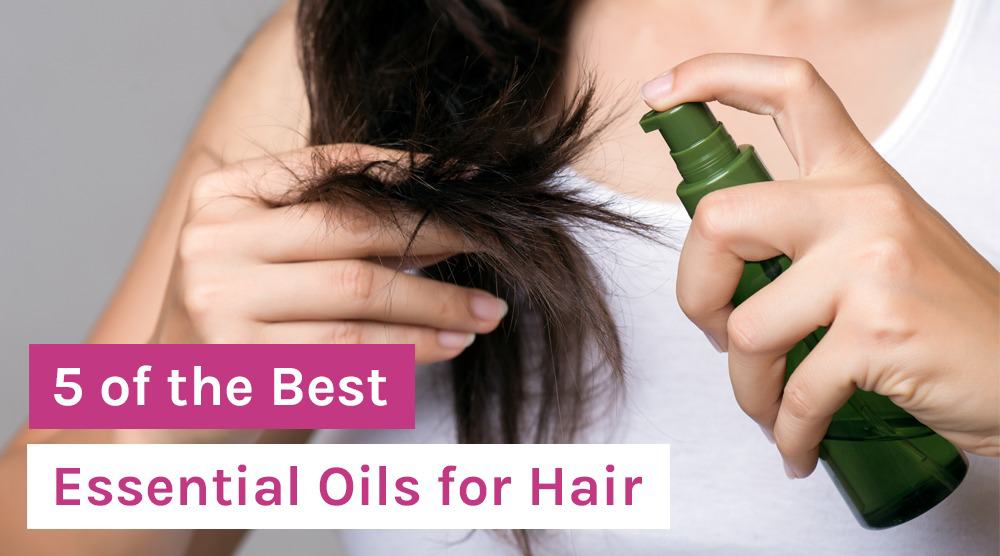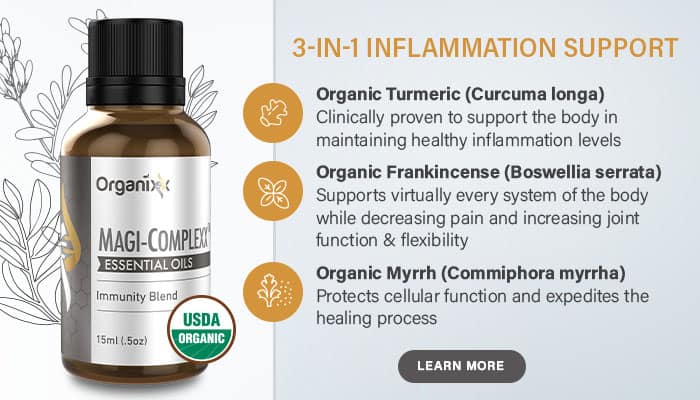5 of the Best Essential Oils for Hair
In a hurry? Click here to read the Article Summary...
Chances are that at some point in your life you may have experienced one or more of the hair problems that most commonly affect people… dry hair, greasy hair, dandruff, flakiness, or hair loss.
As a society, we spend a lot on hair products. In fact, according to Statistica, just under 40 million Americans spent between $50 and $99 on hair products in a quarter, and over 15 million Americans spent $100-199 in the same time period.
With all the types of hair out there, and the fact that lifestyle, nutrition, medication, and age can make us dance between them, it’s no wonder we spend so much on our hair and treating hair problems.
Which Type of Hair Do You Have?
Here are the definitions of the most common hair types:
- Normal Hair: usually has sheen/shine, is untreated by dyes or perms, and is neither greasy nor dry.
- Dry Hair: splits at the ends and tangles easily, looks dull and may be brittle.
- Greasy Hair: often visibly oily, heavy-feeling hair because of glands producing too much oil.
Then there’s dandruff, or other issues with the scalp flaking or being scaly, such as caused by inflammatory skin conditions. Plus you can damage hair by overuse of heating tools such as a hairdryer, straightener, or curler, and from repeated coloring or perming.
This demand for products naturally creates a booming market of options. However, most of the hair care products out there (especially in the lower priced categories) are anything but “natural.”
The Hair-Damaging Chemicals in Your Shower
Many, if not most, of the shampoos and hair products most com monly available include synthetic ingredients that can contribute to our hair challenges.
monly available include synthetic ingredients that can contribute to our hair challenges.
There’s propylene glycol which can cause dry skin and irritation. Sodium lauryl sulfate or laureth sulfate is suspected of corroding hair follicles. Oleyl betaine may contribute to dry scalp and hair.
Then there are the many mineral oils, which clog pores because the molecules are too big for your skin to absorb.
Fortunately there are shampoos and products out there that are less harmful. They can be steeply priced though.
A more economical, but still natural way to address hair problems (including treating hair loss, dry hair, greasy hair, or dandruff) is by using essential oils.
What Are Essential Oils?
Essential oils are nature’s plant powerhouses. They are made by distilling the highly concentrated oils from herbs, flowers, and plants. These oils contain several natural plant chemicals (phytochemicals) that have healing properties.
Unfortunately, too many people still only associate essential oils with aromatherapy, or using their scent to change the ambience of a physical space.
However, plants have been used for thousands of years in ancient cultures. Chinese, ancient Egyptian, and Ayurvedic traditional healing practices all use them in various ways for treating a wide range of illnesses and maladies – including for hair and scalp problems.
These days, science and the public is giving more attention to essential oils for hair growth, and how they can be used for strengthening hair, improving the condition of hair, soothing or stimulating the scalp, and helping with dandruff.
How Can Essential Oils Be Used to Promote Healthier Hair?
Putting oil on your hair may seem counterintuitive. After all, we produce our own oils, and most of us know the feeling of oily hair. The fact is, though, that many factors can strip hair of its natural oils, leaving us with frizz, or a scalp that is itchy and flaky. These include things like wind, dust, and washing our hair too frequently. The correct application of oils can assist with this, leaving hair more vibrant and healthy.
Likewise, conditions in our environment or body can cause our glands to produce too much oil. Essential oils can help with greasy hair too.
In the case of alopecia, or hair loss, essential oils have been used to increase the circulation on the scalp, as well as stimulate hair follicles, which promotes hair growth.
The Best Essential Oils for Hair
There are many essential oils for hair support. We are going to highlight the essential oils for hair with the most science to back them, and the best reputations with experts.
Please make sure you read the list of precautions at the end of this article. Also note you should only ever use the most pure essential oils − no extra fillers or ingredients − from a producer that you trust to use organic plants, and who makes quality their primary purpose.
#1 – Tea Tree Oil
 This strong-smelling oil originates from the leaves of the Melaleuca alternifolia tree in Australia.
This strong-smelling oil originates from the leaves of the Melaleuca alternifolia tree in Australia.
Chances are you’ve heard of this powerful, healing oil. It’s well-known for its ability to help heal skin conditions, and as an effective antiseptic, antibacterial, and antifungal.
For hair, tea tree oil is most useful for flakiness. Tea tree oil has been found successful in treating seborrheic dermatitis, as well as being an effective and well tolerated treatment for dandruff.
Tea tree essential oil has also been found to help psoriasis, as reported by two researchers from the Department of Dermatology, Jundishapur University of Medical Sciences in Ahvaz, Iran, in a 2012 article published in Skin Pharmacology and Physiology. This is likely due to tea tree oil’s “potent anti-inflammatory properties.”
While the fact that tea tree oil helps resolve scalp problems may not be news, that it has been seen to help promote hair growth, might be.
In 2013 a clinical study looked at the effects of using minoxidil (Rogaine) alone, compared to using it in an emulsion that included tea tree oil. The results were remarkable − the addition of tea tree oil demonstrated “a significantly superior response,” with a higher increase in hair count, weight, and thickness.
This pungent oil is said to help unclog the hair follicles. Certainly its antimicrobial properties assist with ridding a scalp from unwanted fungal infections, or acne connected to bacteria.
Suggested Uses:
For dandruff, add a few drops to your shampoo and massage in well. For regrowth, use a good carrier oil like coconut or almond oil. Add a few drops to the oil and mix. Massage in thoroughly, making sure to wash out (avoid your eyes) after about 20 minutes.
#2 – Peppermint Oil
Ah, invigorating peppermint! This essential oil has far too many healing properties to list them all here. You want to know what peppermint oil for hair can do? A lot!
Peppermint oil is good for both greasy and dry hair. The cooling effect will provide a tingle to the scalp, as the blood flow increases to the areas applied. It’s said to open up pores, and promote a balanced flow of oils too. Both these aspects can help with dandruff.
This essential oil is also good for getting rid of lice. [See precautions for children, below.] A 2007 paper published in the Archives of Dermatological Research reported that when combined with eucalyptus oil, peppermint oil was as effective as the commercial lice shampoo treatment available.
Similar to tea tree oil, peppermint oil has been seen to help promote hair regrowth. A study in 2014 reported “significant increase in dermal thickness, follicle number, and follicle depth,” more so than even Rogaine (minoxidil). The study reported that peppermint essential oil demonstrated hair growth of 92% after 4 weeks, compared to 55% for minoxidil.
Suggested Uses:
After checking for allergic reactions [see precautions below], add 2-3 drops of peppermint oil to a carrier oil such as jojoba, coconut, or almond.
Massage deeply into the scalp. Leave for 30 minutes, then wash out. Repeat daily for at least 4 weeks.
Alternatively, you can add a couple drops to your shampoo and conditioner for a cooling effect.
Note: Always avoid the eyes! Peppermint oil in the eyes stings.
#3 – Lemon Oil
Like most essential oils, lemon oil has a variety of medicinal properties. Lemon oil for hair is best used on oily hair. It will clarify and help dry up some of the extra greasiness. The antimicrobial properties will assist with any latent fungus, while acne and dandruff will find relief from its antiseptic benefits.
Though lemon oil is used for oily hair, it can also be useful for a flaky scalp, especially as a preventative. There is also evidence of lemon oil being effective against lice, and that lemon oil promotes hair regrowth.
Suggested Uses:
Add a few drops to your shampoo. For moisturizing, try a weekly oil treatment. Apply a few drops of lemon oil along with a carrier oil as a conditioning treatment you leave in for approximately 30 minutes. Wash out with a gentle shampoo.
Also, for dandruff, you can add 5-6 drops to a couple tablespoons of carrier oil. Massage into your scalp and leave for up to 2 hours then rinse hair well.
#4 – Lavender Oil
 The first thing you need to know about lavender oil is: they are not all created equally. “True lavender,” that being with the most studied and proven healing abilities, comes from a top quality extract from the Lavendula angustifolia plant.
The first thing you need to know about lavender oil is: they are not all created equally. “True lavender,” that being with the most studied and proven healing abilities, comes from a top quality extract from the Lavendula angustifolia plant.
This essential oil is well-known for its many health-promoting properties, including helping with anxiety and stress.
Lavender essential oil for hair supports all hair types: normal, oily, dry, and flaky.
This natural healing oil is said to promote hair growth, prevent loss, as well as improve scalp circulation and dryness. It also is known to help balance the oils, and relieve itching. The antiseptic and antifungal properties of lavender essential oil make it ideal for dandruff and scalp acne.
WebMD states that Lavender oil “deep conditions the hair, keeps it shiny, and helps control dandruff.” In 2016, researchers studying the effects of lavender oil on mice reported “a significantly increased number of hair follicles, deepened hair follicle depth, and thickened dermal layer.”
Earlier research, published in the UK in 1998, reported success with hair regrowth in cases of alopecia. The oils used included lavender and rosemary.
Suggested Uses:
[See warnings below] Work a blend of 8 drops of lavender and 2 tablespoons of coconut oil into your scalp. For a restful night’s sleep (and full benefit of its healing qualities), try covering your head with a scarf or bandana and leaving it in overnight.
For hair regrowth, try mixing with lemon and peppermint for an extra powerful treatment to wash out after about 60 minutes.
#5 – Oil of Rosemary
If you cook, you may be familiar with the distinctive smell of rosemary. The oil, distilled from the leaves of the herb, is a wonderful healing oil. It is full of antioxidants, and is invigorating to the skin and as a head-clearing aroma.
Rosemary oil is good for all hair types. It’s said to unclog pores on the scalp, and balance the head’s oils. It’s thought to be a powerful remedy for dandruff that mixes well with other oils.
WebMD states, “Rosemary oil stimulates the roots, improves hair growth, and increases circulation in the scalp.”
As mentioned above, rosemary was one of the essential oils in a 1998 study that demonstrated clear benefits to patients suffering from alopecia. Regrowth was marked significant in 44% of patients using the oil treatments.
A more recent study published in 2015 looked at rosemary essential oil for alopecia on its own, and reported similar results. In fact, after 6 months of use, rosemary oil showed identical results to minoxidil (Rogaine).
Similarly, in 2013, researchers noted rosemary oil stimulates hair bulbs, indicating it could be used for helping to prevent premature baldness.
Suggested Uses:
[See precautions below] After washing your hair, rub 2-3 drops of rosemary oil on your palms and then run them through your hair while still damp.
For a scalp massage, add 5-6 drops to a tablespoon of carrier oil and rub into the skin. Lightly heat 4 tablespoons of coconut or olive oil, adding about 12-15 drops of rosemary oil. Once cool, rub into your scalp, covering in a hot towel. Leave for 30 minutes, then wash out.

Precautions When Using Essential Oils For Hair
As with all medicines and treatments, caution is required. With essential oils, again, quality is the first concern. Consulting a professional can be extremely beneficial. At minimum, when first starting out with essential oils, go slowly. Test a patch of skin for direct oil applications. Use a carrier oil if your skin is sensitive.
For children, dilution and tiny amounts is critical, and it’s not advised to use essential oils on children under the age of two without guidance from a healthcare professional.
Pregnant or nursing women and the elderly should all exercise extreme caution when using essential oils and also seek the guidance of a qualified practitioner.
If irritation appears using direct treatment (no carrier oil), stop application and try a small area with a quality carrier oil. If irritation continues, discontinue use. If you cannot use carrier oils, try apple cider vinegar, or flower waters.
Special Notes About Peppermint Essential Oil & Rosemary Essential Oil
Peppermint Oil: It’s cooling, but very potent. One drop has the same menthol content of 20 cups of tea! Do not apply near the eyes, genitals, or inside the nose or ears.
Rosemary Oil: This oil can elevate blood pressure so be extra cautious or avoid it if you have high blood pressure. Test a small patch of skin before applying to the scalp.
The powerhouse trio of herbs in Magi-Complexx Essential Oil provides the strongest, most synergistic healing effect, helping sufferers of arthritis pain, constant muscle aches and pains, neuropathy, systemic inflammation, slowed wound healing, circulatory challenges, as well as skin irritations like eczema, psoriasis, and acne.

 Sources:
Sources:
Article Summary
Most hair products contain synthetic ingredients that can contribute to our hair challenges.
Essential oils have been used traditionally to treat hair and scalp problems.
Tea tree oil is most useful for flakiness.
Peppermint oil is good for both greasy and dry hair.
Lemon oil is used for oily hair and flaky scalp.
Lavender promotes hair growth, prevents loss, and improves scalp circulation and dryness.
Rosemary oil helps unclog pores on the scalp, and balance the head’s oils.




Which 2 or 3 oils could be massaged into scalp for hair loss, with a carrier oils I'm assuming? Worried about them not mixing well or burning the scalp.
To aid in hair loss, all of the oils say to combine with carrier, massage and leave in for 20-30 mins. Can all these oils be COMBINED into the same application? If not all, can some be combined, which ones? If not, 5 individual applications
is too time consuming. What is your suggestion for best (1 to 5) oils to use?
Hi Rosalie,
You can definitely choose the oils that suit you best and combine them if needed. Some of the oils are very strong so be sure that you diluting properly and that you are not choosing too many of the strong oils when making your combination. I hope you find this helpful. Have a great day!
Hello, yes, please expound on combining the different oils or do they have to be used individually?
Hello Ronel Dreyer McHenry, This is a great question. When it comes to essential oils we should treat them the same way we treat supplements. Start slowly one at a time. This way you will have a chance to see how each one affects you. If you were having a positive effect or even a negative side effect it may be difficult to determine which addition could be causing it when you use more than one at a time without knowing the effects of each one. Once you understand how your body reacts to each one then you can move into blends if desired. I hope you find this information helpful. Always go with the recommendation of your trusted health care provider. Enjoy your day! :)
How is Lavender Oil used???? Like Tee Tree Oil or different?
Hi Marty, thanks for your question & interest.
Lavender Essential Oil helps promotes hair growth, prevents loss, and improves scalp circulation and dryness.
The suggested use is to work a blend of 8 drops of lavender and 2 tablespoons of coconut oil into your scalp. For a restful night’s sleep (and full benefit of its healing qualities), try covering your head with a scarf or bandana and leaving it in overnight.
For hair regrowth, try mixing with lemon and peppermint for an extra powerful treatment to wash out after about 60 minutes.
Tea tree oil is most useful for flakiness.
For dandruff, add a few drops to your shampoo and massage in well.
For regrowth, use a good carrier oil like coconut or almond oil. Add a few drops to the oil and mix. Massage in thoroughly, making sure to wash out (avoid your eyes) after about 20 minutes.
We hope this helps and wish you a lovely day!
The questions weren’t answered regarding if these oils can be combined, and if so how many drops of each of the five listed oils can we combine and add to a carrier oil or 8 ounces of shampoo. Can you please address this?